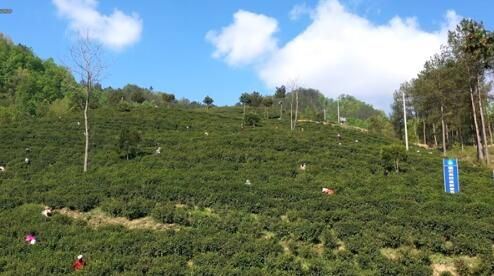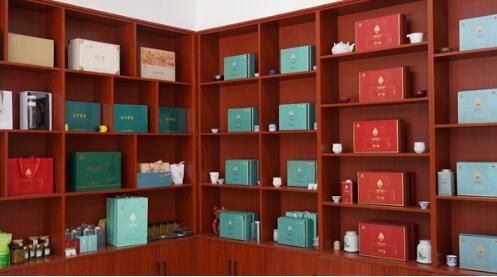Zhenba County, a land blessed with high latitudes, high altitudes, and abundant cloud cover, nurturing high-quality Tea, has recently seen a new lease of life in its tea industry. This transformation would not have been possible without a special group—the “tea second generation” and their efforts and explorations. They are highly educated, well-traveled, and forward-thinking, using tea as a medium and QR codes as a channel to infuse traditional tea enterprises with new vitality.
In Xiangdong Village, Yanchang Town, Zhenba County, Mu Fenghai, General Manager of Hanzhong Nanyangchun Tea Technology Co., Ltd., is planning to build guesthouses around his tea garden, creating a new source of industrial growth. As a member of the “tea second generation,” he has witnessed the transition of his family's tea business from traditional workshop-style operations to modern, standardized, and branded development. Today, their tea garden has expanded from over 200 acres to 1,500 acres, and the quality of the Zhenba Maojian produced has significantly improved, winning numerous national gold awards.
In Tianjing Community, Yanchang Town, Zhenba County, Zhao Deqiang, General Manager of Zhenba Qinan Tea Co., Ltd., also faces the development bottleneck of traditional tea enterprises. However, he chose to focus on quality improvement by building a new processing plant and leasing 1,200 acres of tea gardens, greatly expanding the scale of the industry. Next, he plans to emphasize sightseeing tea gardens, constructing observation platforms and creating an integrated tea-tourism complex to open up new paths for the development of his tea enterprise.
At Longsheng Tea Co., Ltd. in Yanchang Town, Zhenba County, Wang Sen, the company's head, has set the direction for the company's development towards tea-tourism integration and new media operations. He invested in building observation platforms to offer visitors panoramic views of the picturesque thousand-acre tea garden. At the same time, he actively embraces new concepts, aligns with new retail trends, leverages new media, and experiments with short video sales and live streaming to enable more consumers to conveniently order Zhenba tea online.
Li Maofang, head of Hanzhong Fangyue Tea Technology Co., Ltd., is also one of the outstanding members of the “tea second generation.” She continuously learns and improves, treating e-commerce as a crucial sales channel. Through live streaming on Douyin, she successfully introduced Zhenba Maojian to a broader market. Currently, online sales account for half of the company's total sales.


These “tea second generation” members not only inherit their forefathers' traditional tea-making philosophies but have also grown up in the internet information environment, keenly perceiving the immense potential of e-commerce and tea-tourism integration. Through channels like QR codes, they closely connect their tea enterprises' products and sales with the internet, providing traditional tea businesses with new opportunities for a fresh takeoff.
Thanks to their efforts, Zhenba County's tea industry has achieved remarkable results. From the birth of Shaanxi Province's first famous tea, “Qinba Fog Silk,” in 1984, to the comprehensive promotion of “High-mountain Selenium-rich Tea,” Zhenba has been honored with titles such as “China's Famous Tea Hometown,” “One of China's Top Ten Charming Tea Villages,” and “National Key Tea-Producing County.” By the end of 2025, the county's tea garden area reached 150,000 acres, with a production volume of 5,508 tons and a value of 780 million yuan.
Today, Zhenba County's tea industry is welcoming a new spring. These “tea second generation” members, with their innovative spirit and practical actions, are injecting new vitality into rural revitalization in Zhenba County. They believe that in the days to come, Zhenba's tea industry will thrive even more. (Shaanxi AoXiang Network Technology Co., Ltd.)